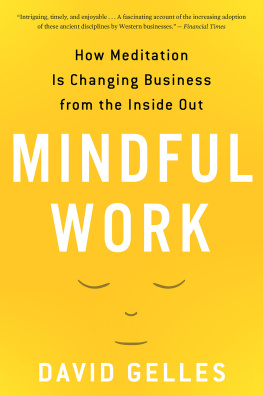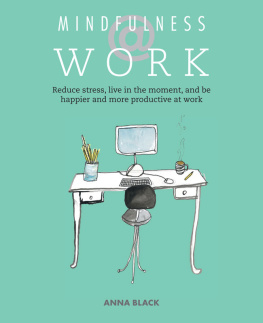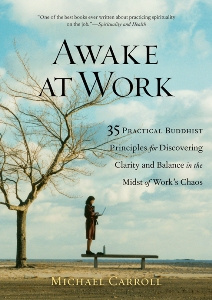First Mariner Books edition 2016
Copyright 2015 by David Gelles
All rights reserved
For information about permission to reproduce selections from this book, write to or to Permissions, Houghton Mifflin Harcourt Publishing Company, 3 Park Avenue, 19th Floor, New York, New York 10016.
www.hmhco.com
Library of Congress Cataloging-in-Publication Data
Gelles, David (Business journalist)
Mindful work : how meditation is changing
business from the inside out / David Gelles.
pagescm
An Eamon Dolan book.
Includes bibliographical references and index.
ISBN 978-0-544-22722-4 (hardcover) ISBN 978-0-544-22632-6 (ebook) ISBN 978-0-544-70525-8 (pbk.)
1.LeadershipPsychological aspects. 2. Meditation. 3. Mind and body. 4.Social responsibility of business. I. Title.
BF637.L4G447 2015
158.7dc23
2014039685
Cover design by Laserghost
v3.0316
FOR
FRANNY
Introduction
SATURDAY, JUNE 6, 1981 .
It is a steamy summer day in Boston. At the Park Plaza, a grand hotel just off the Common, a nerdy crowd packs a high-ceilinged ballroom, stirring under the chandeliers, waiting for a man it reveres as a visionary. The thronging massesalmost all young menare super-fans of the personal computer, techies at the vanguard of a revolution that would soon upend the way we live and work. Their guest of honor is Steve Jobs.
Just twenty-six years old, Jobs has rocketed to international stardom in recent months. Apple, the company he cofounded and runs, has just gone public. His flagship product, the Apple III, is revolutionizing how people use technology. He is already worth $250 million.
Jobs is in Boston to address Applefest, an event for devotees of his products organized by an eighteen-year-old computer whiz named Jonathan Rotenberg. Applefest was put together without Jobss knowledge, and he agreed to come only at the last minute, perhaps sensing some kinship with the young, ambitious organizer. Lean and lanky, Jobs sports a full beard and bushy black hair that falls over his ears and past his collar. He could be a folk singer were it not for the dark suit, blue dress shirt, and black tie. Wide-framed eyeglasses cover nearly half his angular face. In the heat, he has removed his jacket, slinging it over his left shoulder.
After lunch, Jobs and Rotenberg walk back to the Park Plaza. All day, hundreds of fans have been tinkering with the newest Apple machines, swapping notes, and dreaming about how computers might change their lives, and the world, in the years to come. Now theyre assembled in the ballroom, waiting to hear from the man who has made their futuristic dreams come true.
Despite his youth, Jobs looks cool and collected. A contented grin graces his face, perhaps understandable for a multimillionaire. Yet with nearly one thousand of his most loyal customers in the audience, even Jobs must feel some nerves. These are his early adopters, the hard-core users hes counting on to sustain his company over the coming years. Backstage, ten minutes before the keynote speech is set to begin, the teenage Rotenberg is also a ball of nerves. He and Jobs make some small talk, but both are anxious for the keynote to begin. Then Jobs says, Jonathan, would you excuse me for a minute?
Rotenberg turns around, and Jobs is gone. Is it stage fright? Has he just gone to the bathroom? Or is Jobs, already known for his enigmatic behavior, playing one of his mind games? Long minutes drag out. The crowd beyond the stage stirs, restless in the heat. It is now four minutes before the speech is to start and Rotenberg begins to panic. If Jobs gets cold feet and bails, Applefest will be a disaster. Rotenberg will be humiliated. The host paces backstage, searching for his speaker just moments before the main event. A few more minutes tick by. Jobs is nowhere to be found. Then, finally, in a corner of the jumbled backstage area, Rotenberg spots him.
Jobs is sitting on the floor. His legs are crossed. His posture erect, he faces the wall, unmoving. At the precipice of one of the biggest moments of his career, Jobs has paused to meditate.
As Rotenberg looks on, Jobs enjoys another few moments of stillness amid the backstage tumult. Finally, slowly, Jobs gets up, smiles at Rotenberg, and makes his way to the stage. He emerges from behind the curtain and into the spotlight. The crowd roars.
Steve Jobss ability to be calm and concentrated in the midst of chaos was one of the things that made him such a great leader. Though he was far from perfect, Jobss focus, insight, and creativity set himand Appleapart from the competition. And in that moment backstage, Jobs wasnt praying to any divinity, visualizing any mandala, or reciting some mantra. He was, in all likelihood, doing what he had been trained to do by his meditation instructorssimply paying close attention to the sensations of his own breath, the physicality of his body, and observing the thoughts in his mind nonjudgmentally. He was taking a few moments to be mindful.
Jobs was Americas first mainstream meditating CEO, a disciple of the Zen Buddhist tradition, and a keen student of Eastern philosophies. But he mostly practiced in isolation, studying intensely with his Japanese teacher, sharing his interest with a few close friends, but rarely bringing his meditation into the office. Today, however, mindfulness is everywhere, almost as ubiquitous and transformative as Apple products themselves.
What was a fringe movement when Jobs addressed Applefest in 1981 is now an increasingly prominent part of the cultural landscape, turning up in businesses, governments, and educational institutions around the world. Senior executives at Ford, Google, and other blue-chip companies are practicing meditation and incorporating contemplative practices into the workplace. Members of Congress are meditating on Capitol Hill. Some corporate campuses have a meditation room in every building, and insurance plans are covering meditation classes. Silicon Valley is swarming with tech-savvy meditators, continuing Jobss legacy. Even hedge fund managers are using meditation to gain an edge in their trading.
Across industries, there is an elite subculture of accomplished professionals who are discovering the power of mindfulness. They are becoming more effective and more focused and in the process getting better at their jobs. Mindfulness is also allowing workers who practice it to make less-emotional decisions, and to feel happier, too, providing a competitive advantage in the office, and in all realms of life.
Mindfulness, put simply, is the ability to see whats going on in our heads, without getting carried away with it. It is the capacity to feel sensationseven painful oneswithout letting them control us. Mindfulness means being aware of our experiences, observing them without judgment, and responding from a place of clarity and compassion, rather than fear, insecurity, or greed.
Scientific research is making the benefits clear. Studies show that mindfulness strengthens our immune systems, bolsters our concentrative powers, and rewires our brains. Just as lifting weights at the gym makes our muscles stronger, so too does practicing mindfulness make our minds stronger. And the most tried-and-true method of cultivating mindfulness is through meditation.
Meditation doesnt require us to wear robes, chant in a foreign language, or sit with our legs folded. Instead, mindfulness meditation simply asks that we take a comfortable positionsitting, lying down, or even standingand observe our thoughts, emotions, and sensations. Pick a sensation, such as the breath moving in and out of the nostrils, and focus on it. Feel the subtleties of air passing in and out; notice the whole body rising and falling with each inhalation and exhalation. When the mind wanders, as it inevitably will, notice the thoughtwithout getting caught up in itand return the attention to the breath. When the mind wanders again, sometimes just a few seconds later, bring the attention back to the breath, and begin again.
Next page








